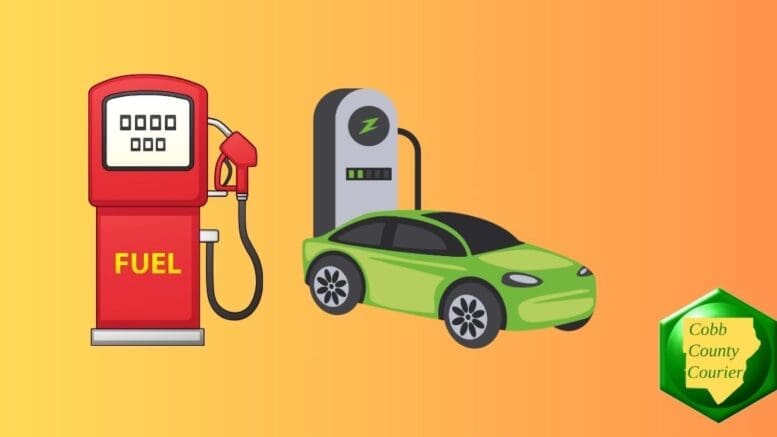Gas prices in Georgia have been on the downswing for the past seven days.
According to AAA’s weekly report, gasoline prices in the state dropped six cents over the past week, reaching an average cost of $2.98 per gallon for regular unleaded. This followed an upward swing the previous week.
“Several factors contributed to the drop in gas prices,” said Montrae Waiters, AAA-The Auto Club Group spokeswoman. “Lower crude oil prices, demand has tapered off now that Spring Break has ended in Georgia, and a hefty gasoline supply in the U.S.”
Meanwhile, the national average per kilowatt-hour of electricity at a public EV charging station remained steady at 34 cents.
What will you learn by reading below?
- How do prices in Cobb County compare to the rest of the state
- What are the national trends in gasoline prices and EV charging rates?
- What causes fluctuations in gasoline prices?
- How does AAA arrive at its price estimates?
Gasoline prices in Cobb County
The price of a gallon of regular unleaded in Cobb County is $3.067, about nine cents more than the statewide average.
It is always possible to find lower gas prices than the average by comparison shopping or using tools like http://gasbuddy.com.
What are the national trends?
AAA’s weekly report stated the following about national gas and oil trends:
Gas Prices Reverse Course
Since last Monday, the national average price for a gallon of regular gasoline has decreased by 7 cents to $3.18, subject to change overnight. Prices at the pump are coming down even though this is the time of year when gas prices go up. Supply and demand are the main reasons for the dip. After OPEC+ announced its increasing oil production for next month by more than 400,000 barrels a day – much more than expected – the price of crude oil has been falling. Oversupply and tepid gasoline demand are resulting in lower pump prices.
According to new data from the Energy Information Administration (EIA), gasoline demand decreased from 8.49 barrels a day last week to 8.42. Total domestic gasoline supply decreased from 237.6 million barrels to 236.0. and gasoline production decreased, averaging 8.9 million barrels per day.
Oil Market Dynamics
At the close of last Wednesday’s formal trading session, WTI rose $2.77 to settle at $62.35 a barrel. The EIA reports that crude oil inventories increased by 2.6 million barrels from the previous week. At 442.3 million barrels, U.S. crude oil inventories are about 5% below the five-year average for this time of year.
Electric:
Meanwhile, the national average per kilowatt-hour of electricity at a public EV charging station remained at 34 cents today. Drivers can find electric charging prices along their route using the AAA TripTik Travel Planner.
What causes fluctuations in gasoline prices?
According to the U.S. Energy Information Administration (EIA), the price of crude oil is the main factor affecting the price of gasoline.
“Strong and increasing demand for gasoline and other petroleum products in the United States and the rest of the world can place intense pressure on available supplies,” the EIA website states.
According to the EIA, other factors that can affect prices include” disruptions in crude oil supplies, refinery operations, or gasoline pipeline deliveries.”
There are also seasonal changes in demand that cause price fluctuations throughout the year.
For more information on the price considerations for crude oil and gasoline, visit the EIA website.
How does AAA determine gas prices?
According to AAA:
“AAA updates fuel price averages daily at www.GasPrices.AAA.com. Every day up to 130,000 stations are surveyed based on credit card swipes and direct feeds in cooperation with the Oil Price Information Service (OPIS) and Wright Express for unmatched statistical reliability.
“All average retail prices in this report are for a gallon of regular, unleaded gasoline.”
